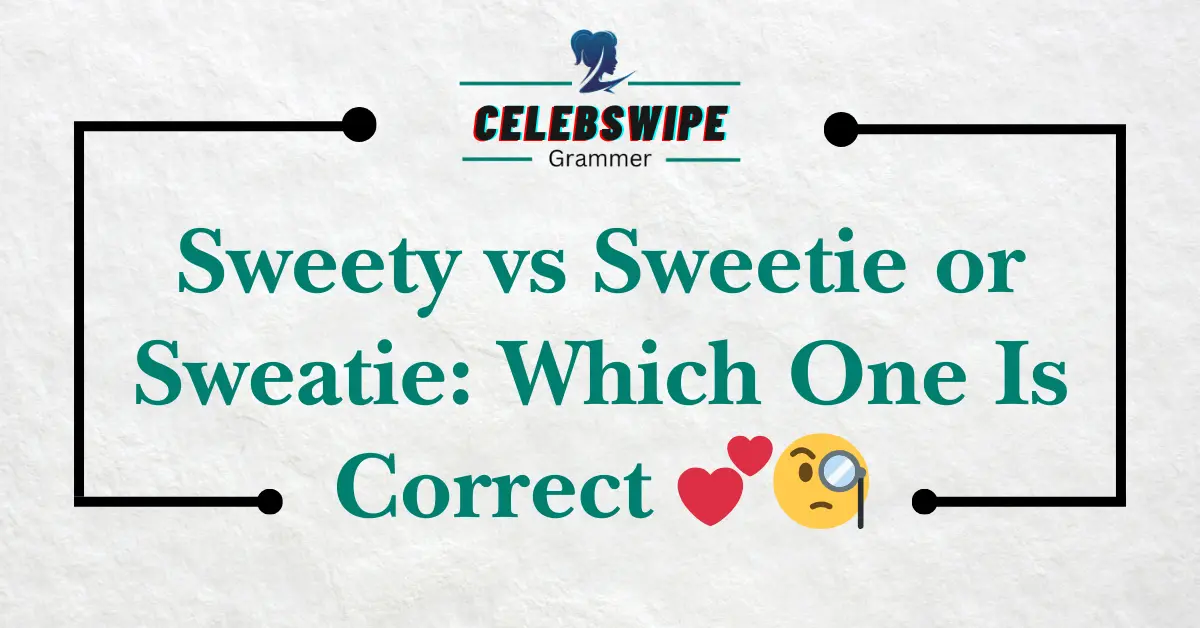Language can be tricky, especially when it comes to spelling variations like “Sweety,” “Sweetie,” and “Sweatie.” These terms of endearment often leave people scratching their heads, wondering which one is correct. In English-speaking countries, particularly the United States, choosing the right spelling matters in both personal and professional communication. Whether you’re texting a loved one or writing a note, understanding the subtle distinctions can save you from awkward misunderstandings.
This article dives deep into the difference between these three affectionate terms. We’ll explore their definitions, origins, and how they’re used in different contexts. By the end, you’ll know exactly when to use “Sweetie,” “Sweety,” or why to avoid “Sweatie” altogether. Let’s untangle this linguistic puzzle and make it easy for you!
Understanding English Spelling Complexity
The English language is a linguistic melting pot with influences from Germanic, Latin, and French roots. This explains why there are so many orthographic variants like “Sweety” and “Sweetie.” These spelling differences often confuse both native speakers and learners. Words that sound alike but are spelled differently are a common feature of English, leading to context changes depending on the spelling.
For example, in British English, the word “colour” includes a “u,” while American English drops it as “color.” Similarly, “Sweety” is an informal variant of “Sweetie,” but cultural nuances often determine which one is used. Understanding these stylistic variations is crucial for effective communication.
Factors Contributing to Spelling Variations
Why do people spell words differently? Historical influences and the evolution of language play a significant role. Over time, languages adapt based on usage, pronunciation, and even technology. In texting or social media, shorter forms like “Sweety” often replace traditional ones like “Sweetie.”
Cultural differences also matter. In some English-speaking regions, “Sweety” might feel more intimate, while “Sweetie” is widely accepted in formal or casual contexts. This is where cultural and regional norms come into play. People may assume they’re interchangeable terms, but that’s not always the case.
Comparative Table of “Sweetie,” “Sweety,” and “Sweatie”
| Word | Definition | Usage | Correctness |
| Sweetie | Standard term of endearment | Romantic or friendly use | ✅ Yes |
| Sweety | Informal variant, less common | Texting or casual writing | ✅ Yes |
| Sweatie | Misspelling or typo | Rare, incorrect usage | ❌ No |
Sweetie vs. Sweety: Decoding the Correct Usage
Definition and Origin of “Sweetie”
The word “Sweetie” is a loving nickname that comes from the Old English term “swete,” meaning pleasant or kind. It’s a widely accepted affectionate term used in close relationships, including romantic relationships and friendships. In modern times, it’s a staple of American English.
Definition and Usage of “Sweety”
“Sweety,” on the other hand, is an alternative spelling often seen in informal settings like texts or casual notes. While it’s not as common as “Sweetie,” it is still understood by most native language speakers. However, it’s less appropriate in professional or formal scenarios.
Sweatie: The Odd One Out
“Sweatie” is an example of how misspellings occur in the English-speaking world. This typo likely stems from phonetic confusion, but it is not a recognized word in formal English. Unlike “Sweetie” and “Sweety,” it lacks a clear origin or definition.
Using “Sweatie” can lead to misunderstandings. For instance, in a professional email or note, such a misspelling might come across as careless. The key is to avoid assuming that spelling differences like these are minor. They can significantly impact how your message is perceived.
The Cultural Context of Pet Names in English
In Anglophone countries, pet names like “Sweetie” and “Honey” hold a special place in intimate relationships. They provide emotional sustenance and reinforce bonds between partners, friends, and family members. Cultural perception of these sweet nicknames often determines their appropriateness.
In America, terms of endearment like “Sweetie” are incredibly popular in romantic relationships. However, cultural and regional norms influence how they are used. For example, British speakers might prefer “Love” or “Darling” as their go-to affectionate nicknames.
Historical Journey of “Sweet” and Its Variants
The word “Sweet” traces back to Old English “swete,” reflecting qualities of kindness and affection. Over centuries, it evolved into affectionate terms like “Sweetie.” This historical impact shows how language adapts to reflect emotions and connections.
Interestingly, “Sweety” emerged as a casual version of “Sweetie,” especially in informal writing. Historical records, however, rarely feature “Sweety,” emphasizing its modern and less formal origin. This historical journey reveals how spelling evolves with changing communication styles.
Connotations and Context
Both “Sweetie” and “Sweety” carry positive meanings, but context matters. In professional settings, using such terms can feel out of place. However, in personal connections, they convey warmth and affection. Context shifts play a huge role in determining their appropriateness.
For example, using “Sweetie” with a close friend is endearing, but addressing a colleague this way could feel awkward. Understanding these delicate distinctions is essential to navigate different scenarios effectively.
Expert Tips for Choosing Between Sweetie and Sweety
To avoid confusion, use “Sweetie” in most cases. It’s a universally accepted term in close bonds and personal connections. On the other hand, reserve “Sweety” for casual, informal messages. Avoid “Sweatie” entirely to maintain clarity and professionalism.
When in doubt, consider the setting. In formal occasions, stick to neutral language to avoid misunderstandings. Useful tips like these ensure your communication stays respectful and clear, no matter the audience.
Cultural Sensitivities and Etiquette
In a linguistic melting pot like the U.S., being mindful of cultural specifics is crucial. What works as a term of endearment in one culture might feel inappropriate in another. For example, “Sweetie” may be common in America, but less so in some Asian cultures.
To navigate these cultural subtleties, stick to neutral terms in multicultural settings. This ensures you avoid unintentional offense while maintaining meaningful communication.
Example sentences to clarify the usage of Sweetie, Sweety, and Sweatie:
Sweetie
- “Come here, Sweetie, I have a surprise for you!”
- “Thanks for helping me with my project, Sweetie. You’re the best!”
- “It’s okay, Sweetie; everyone makes mistakes.”
- “My grandma always calls me Sweetie when she’s in a good mood.”
- “Goodnight, Sweetie! Sleep well.”
Sweety
- “Hey there, Sweety, how was your day?” (Used informally in a text message)
- “You’re such a Sweety for remembering my birthday!”
- “Don’t worry, Sweety, I’ll take care of it for you.”
- “That little kid is such a Sweety; she shared her candy with everyone.”
- “Thank you for the flowers, Sweety!”
Sweatie
- “Oops, I accidentally typed Sweatie instead of Sweetie in my text!”
- “Sweatie isn’t even a real word, but it pops up when I type too fast.”
- “Someone called me Sweatie in an email, and I’m pretty sure it was a typo.”
- “Avoid using Sweatie; it’s not the right spelling for a term of endearment.”
- “Did you mean Sweetie? Because Sweatie doesn’t make sense here.”
Read More >>> Stigmatism vs Astigmatism – What’s the Difference?
Frequently Asked Questions
How do you spell sweety or sweetie?
The correct spelling is Sweetie, but Sweety is an informal variation. Sweatie is incorrect.
When can I use Sweetie?
Use Sweetie in close or intimate relationships like with a partner, child, or friend. Avoid it in formal or professional settings.
Who do we call sweetie?
We call Sweetie to someone we care about, such as a partner, family member, or close friend, to show affection.
What does Sweety mean from a girl?
When a girl says Sweety, it’s a sign of affection, care, or kindness, depending on the relationship and context.
Conclusion
When it comes to affectionate terms, “Sweetie” reigns supreme as the correct and widely accepted spelling. “Sweety” is a valid but informal alternative, best used in relaxed settings. “Sweatie,” however, is a misspelling that’s best avoided. By understanding these subtle nuances, you can communicate effectively, whether in love relationships or professional settings.
Choose your words thoughtfully and always consider the context. As a result, your sweet words will leave a lasting impression, no matter the setting.

